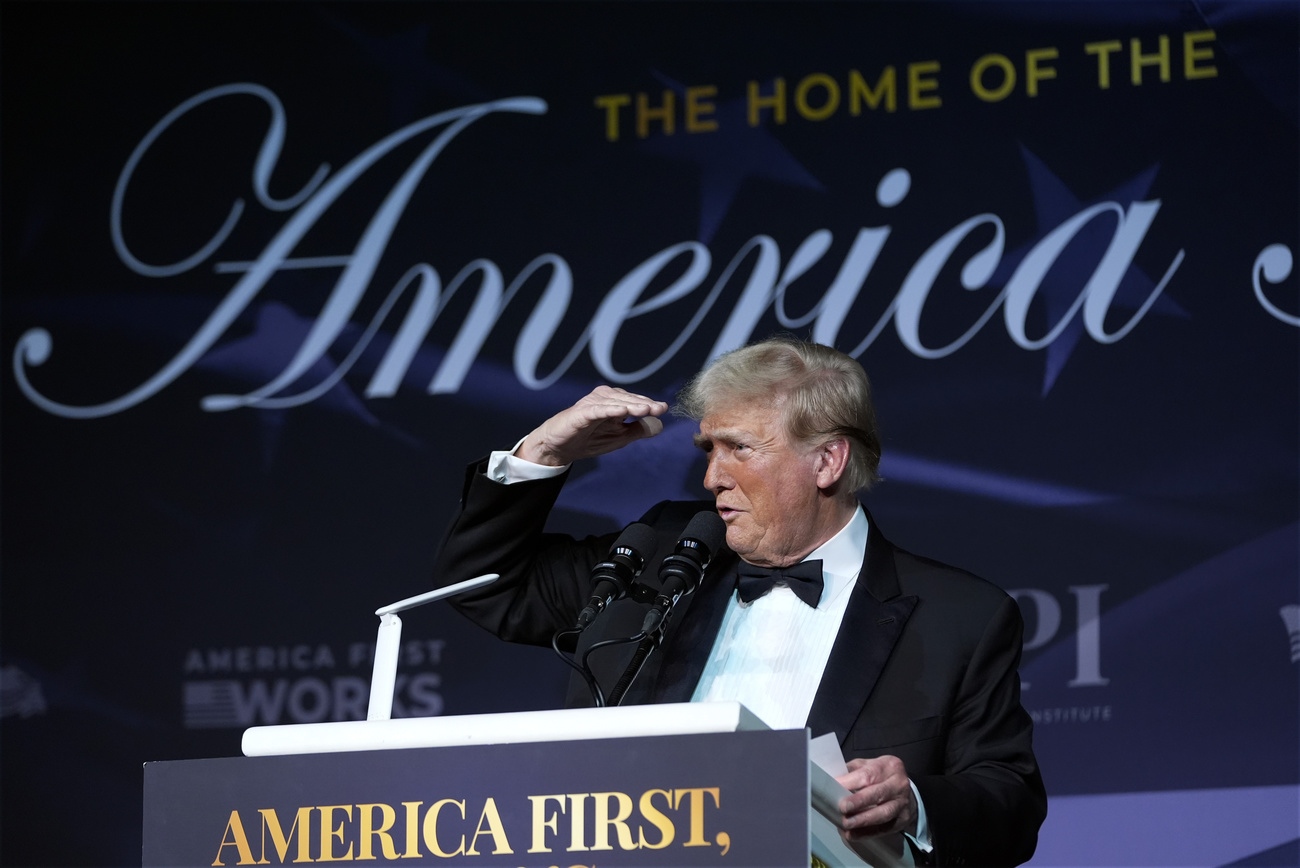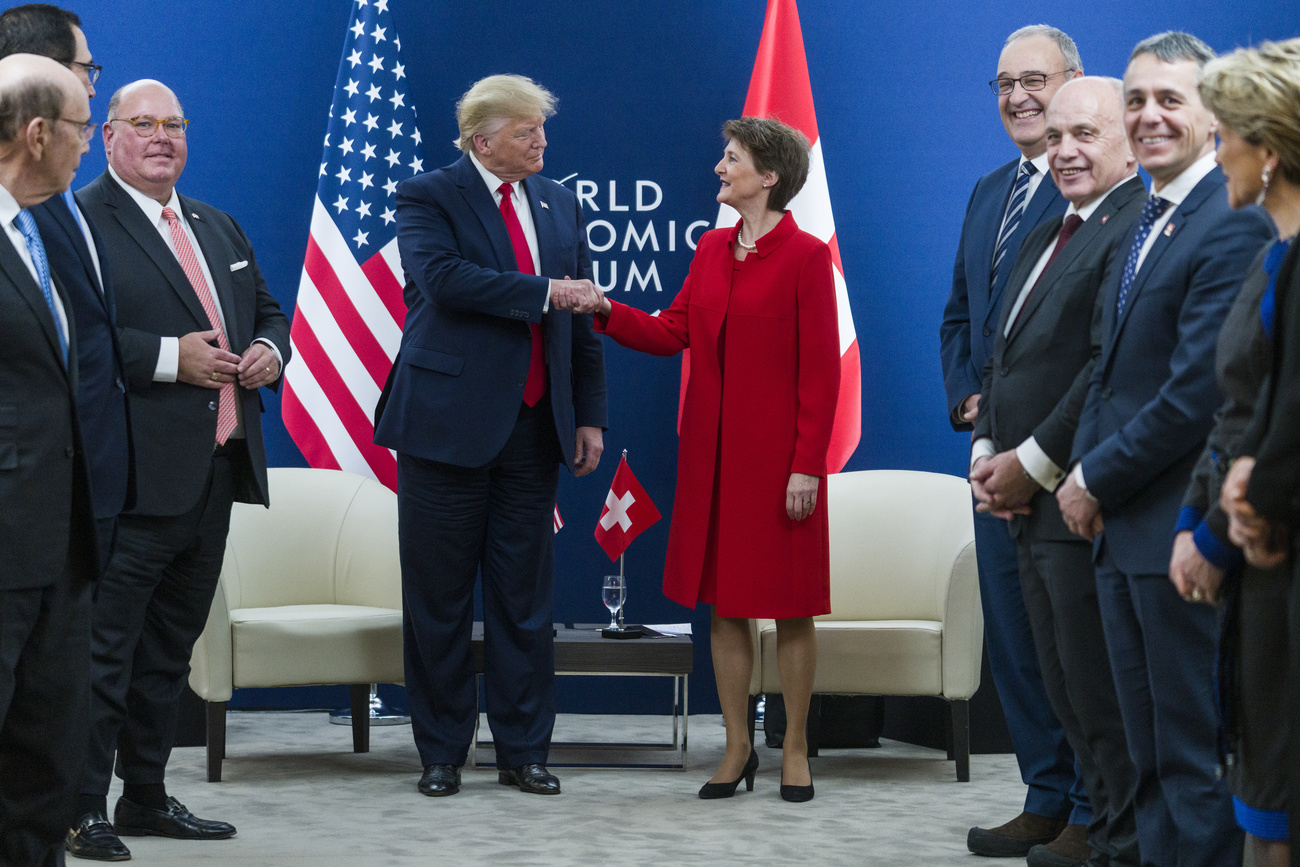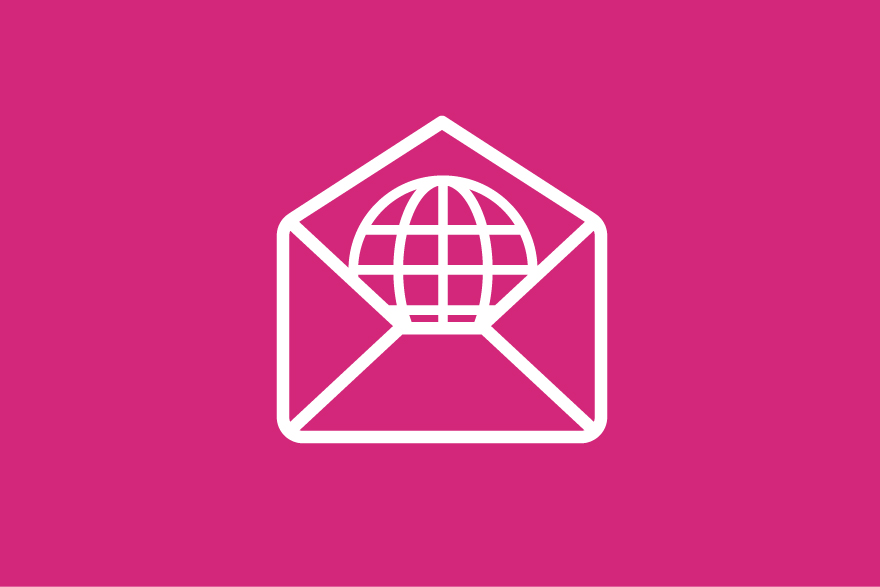How can Switzerland prepare for Trump 2.0?

Upon arriving in the White House for the second time, Donald Trump is expected to adopt an isolationist and unpredictable foreign policy. If this comes to pass, how will Switzerland, which favours a stable, rules-based international system, maintain a smooth relationship with the United States, a key trading partner?
The day after the Republican candidate decisively won the 2024 US presidential race, Suzi LeVine, the US ambassador to Switzerland under Barack Obama, was, like many, coming to terms with Trump’s imminent return to the Oval Office.
“This election is going to have repercussions for decades to come,” said LeVine, “and not just in the United States, but for everybody – and every creature – in the world.”
How best to prepare for some of Trump’s more radical foreign policy ideas is a question now preoccupying the world’s capitals. The president-elect has threatened to impose high tariffs on US imports, withdraw support for the transatlantic defence alliance NATO, and end the US’s global climate commitments. Switzerland, while not a member of NATO or the European Union, has close ties with both.
Small powers, however, are likely to fly under the radar of the Trump administration, according to Stefan Legge, an international trade expert at the University of St. Gallen’s Institute for Law and Economics.
David Sylvan, emeritus professor at the Geneva Graduate Institute, echoed this, saying: “The Swiss have to understand that they’re extremely low priority [in Washington].” This, he added, could be an advantage in terms of avoiding getting caught in the Republican’s crosshairs – if Bern plays its cards right.
A new trade war?
One of Switzerland’s main priorities will be to preserve good economic relations with the US, its second-largest trading partner after the EU and its biggest export market for goods, worthExternal link CHF56.6 billion ($64.3 billion) in 2023.

More
What Trump’s return or a new Harris administration would mean for Switzerland
Trump has vowed to impose up to 20% tariffs on all imports (and as much as 60% on those from China). Economists sayExternal link several key Swiss sectors, including pharmaceuticals, machinery, watches and foodstuffs, would be affected by this measure, which could trigger a 0.2% fall in GDP.
The State Secretariat for Economic Affairs said “Switzerland clearly rejects the [tariff] plans” and would discuss the issue with relevant US authorities and other trade partners, such as Germany.
Trump’s threats over tariffs could simply be bluster, a way for him to build leverage with other states, said Legge. Uppermost in Trump’s sights is the EU, which the incoming president has said will “pay a big price” for its trade surplus with the US.
As a bloc, the EU plans to boostExternal link its competitiveness in the wake of Trump’s election – good news for Switzerland, which depends on a strong European economy for its own prosperity, said Legge.
But if Brussels’ economic relations with Washington were to sour, a new trade war similar to the one conducted during Trump’s first term could spell trouble for Bern. Back then, the EU did not exclude Switzerland from retaliatory measures it took after the US slapped tariffs on imported metals.
Whatever happens, said Legge, it’s crucial for Switzerland to maintain “excellent access to other markets, including the vast EU market”.
Bilateral trade deals
To “break through” any future US customs barriers, some Swiss industry leaders are urgingExternal link the government to negotiate a free trade agreement (FTA). The two countries held exploratory talks on a deal during Trump’s previous presidency. Ed McMullen, who served as ambassador to Switzerland at that time, has said the US would “like to conclude an agreement” during a second Trump term.

More
How a norm-breaking American presidency affected Switzerland
Switzerland is not alone in considering a bilateral deal to avoid the negative impact of a trade war. The British government is weighing its optionsExternal link, between striking an FTA with the US or fostering closer economic ties with Europe. And in Canada, which has a continental trade deal with the US and Mexico which Trump wants to renegotiate, some politicians believeExternal link their country may be better off with a bilateral accord instead.
But Legge doubts that a Swiss-US deal is achievable. “What could it offer to the US? Very little, unless we open up the agricultural sector,” he said, adding that getting a political consensus for ending Swiss protectionism on agriculture, even partially, is highly unlikely.
If Switzerland has little to offer, then it’s better to leave the FTA alone and keep a low profile, said Sylvan. Like the EU, he added, Switzerland runs a trade surplus in goods with the US, a fact that Trump could take issue with if brought to his attention.
“The last thing [the Swiss] would want is to be asked, what can you do for us?” said Sylvan, “because at that point, it’s going to get really tough.”
Another new member for NATO?
A further quandary could emerge for Switzerland if Trump makes good on his promise to get “a quick deal” to end the war in Ukraine. The president-elect is yet to elaborate on his plans in this regard, but if he pressures Ukraine into accepting a deal against the wishes of its European backers, said Sylvan, “there’s going to be all kinds of tensions”. Switzerland would have to decide what is in its best interest – to side with the Europeans or support the Americans in their bid for a deal.
Things could also become complicated if an emboldened Russia engaged in sabre-rattling in the Baltic states – the possibility of the Kremlin attacking a country beyond Ukraine is a real concern on the continent, said Sylvan. “Would [Switzerland] feel secure in that case?” he said. “I suspect not.”
The answer, according to Centre Party president Gerhard Pfister, is for Switzerland to get closer to NATO while maintaining its neutrality. This would be critical since Switzerland, with its current military capacity, is unable to defend itself, Pfister said.

More
Switzerland and NATO: just flirting or the start of a wild marriage?
Trump’s former national security adviser, John Bolton, went further, telling Swiss newspaper SonntagsBlick that Switzerland should simply join NATO – as Sweden and Finland were compelled to do following Russia’s invasion of Ukraine. “Neutrality has no future in light of the new geopolitical situation,” he said. Trump, he added, “doesn’t understand what common defence means” and could well pull the US out of the alliance.
For Legge, it’s clear that Switzerland must increase its defence spending. Parliament has agreed to take measures that will see this reach 1% of GDP by 2030. The target for NATO members is 2% of GDP. But the landlocked country must also nurture good relations with all key powers – the EU, the US and China, which is locked in a “strategic rivalry” with the US and also has strong economic ties with Switzerland.
“The bottom line is, Trump is unpredictable,” said Legge. “We have to go through the ‘what if’ options, be pragmatic and figure out ways we can improve the bilateral relationships, so that none of the big players has an incentive to go after us.” For example, buying American military equipment, as Switzerland did with F35 jets in 2022, could help to placate a president-elect who likes to do deals, said Legge.
A chance to lead on energy transition
One campaign promise that Sylvan is certain Trump will keep is to pull the US from the Paris climate accord, just as he did in his first term. Trump has also indicated he will repeal the Inflation Reduction Act, passed under President Joe Biden to expand clean energy, and roll back other regulations to allow for more oil and gas production – although fossil-fuel extraction has already reached a peak, Sylvan pointed out. Trump’s nominee for energy secretary is Chris WrightExternal link, an oil industry executive who in the past has denied there was a climate crisis.

More
Our weekly newsletter on foreign affairs
All of this means the US “is likely to remain the biggest polluter on the planet for years to come,” warned Green Party parliamentarian Nicolas Walder, who sits on the House of Representatives foreign affairs committee. Trump’s proposals, he added, could dissuade other states from pursuing “ambitious reforms” for climate protection and incite them to invest in fossil fuels.
They would also have a direct impact on Switzerland, said former ambassador LeVine: the country is a Paris accord signatory whose Alpine glaciers could disappear by the end of the century due to rising temperatures.
To counter any US action, Walder said Bern should cooperate more closely with Brussels on climate goals, such as the ones set out in the 2019 EU Green DealExternal link.
The next US presidency does not have to spell doom for the global fight against climate change, Walder believes. “It offers Switzerland and Europe an opportunity to take the lead in the vital energy transition,” he said. “For me, that’s an opportunity our country should not pass up.”
Edited by Lindsey Johnstone/ts

In compliance with the JTI standards
More: SWI swissinfo.ch certified by the Journalism Trust Initiative









You can find an overview of ongoing debates with our journalists here . Please join us!
If you want to start a conversation about a topic raised in this article or want to report factual errors, email us at english@swissinfo.ch.